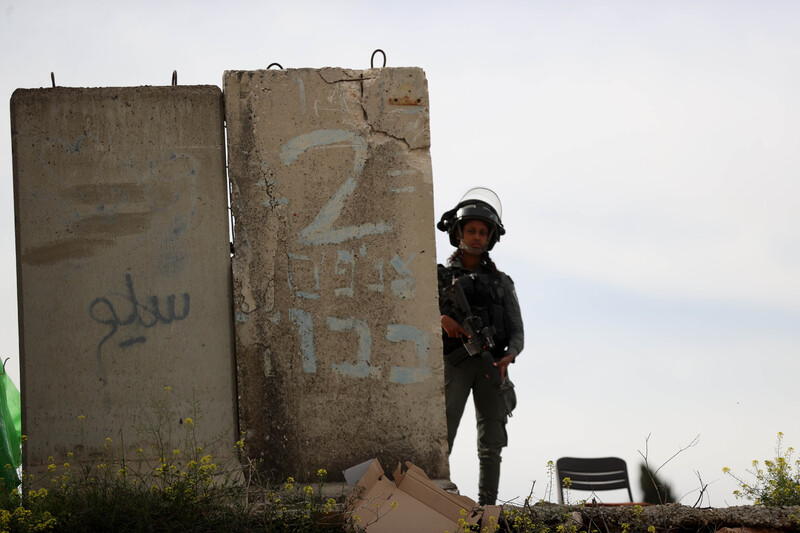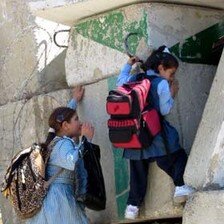The Electronic Intifada 24 September 2025

An Israeli soldier near the Qalandiya checkpoint separating Ramallah and Jerusalem, 28 March 2025. (APA Images)
Every morning I drive my kids, aged 14 and 11, to school in Birzeit, just five minutes from our home in Ramallah in the West Bank. I watch them carefully as they enter the school’s gate, but I still worry about their safety and I silently ask God to protect them.
Then, on most mornings, I drive to work – a 15-minute drive usually, but with traffic it takes 30 minutes.
I love the atmosphere of Ramallah; it’s a culturally rich and international city. But it, alongside al-Bireh, is also surrounded by 156 military checkpoints.
I pass Birzeit University then wind through two small villages.
Sometimes Israeli soldiers block the road by al-Jalazone refugee camp that leads to Ramallah, so the traffic intensifies. Near the end of my drive, I pass by the Yasser Arafat Museum, crowned with the Palestinian flag like all official institutions.
Last April, I was settling into the office on a Wednesday morning after dropping my children off at school, a cup of coffee on my desk, when I heard a colleague scream.
We all rushed to her. She had called her children’s school in Atara, a village near Ramallah, and an Israeli soldier had picked up the phone and said “soldiers, soldiers” and then quickly hung up.
Her husband, who was still in the village, couldn’t do anything except watch helplessly from a distance as the soldiers stormed the schoolyard and questioned the children.
The pretext for this morning “visit” from Israeli soldiers to a school full of children?
A convoy of 12 armored jeeps had been passing by the school, and the soldiers claimed that a stone had hit one of the jeeps.
Yet such claims are nothing more than excuses.
The real story doesn’t begin with a stone, it begins the moment the convoy drives through a Palestinian village. What are they doing here in the first place?
That afternoon, at home, I found that my children had also seen the occupation convoy pass by their classroom window.
“The lesson was stopped,” they said, “and we watched them through the windows.”
All my colleague’s fears rushed through my mind, while my kids just laughed, happy that the lesson had been paused.
Slow genocide in the West Bank
Not two hours away in Gaza, our people no longer enjoy a basic right to life.
Our daily life in Ramallah is shadowed by the occupation in every aspect. We are living under a slow genocide in the West Bank, with Israel’s annexation of more land, daily killings at the hands of settlers and soldiers, and constant financial strain.
Still we carry deep guilt for the genocidal war against our people, families and friends in Gaza. Every piece of bread we eat, every sip of water we drink, remind us that while we struggle, we are still “lucky” to survive, yet survival should be a basic right, not a privilege.
Being home in the afternoon, surrounded by walls and windows, embracing my children, feels like a blessing in Palestine.
Yet the nature of the occupation is that it does not let us live fully. It is utterly abnormal to live under occupation and to live with the accompanying understanding that a genocidal war continues in Gaza, which every international power has failed to stop.
When I wake up, I turn on the news. The occupation of the West Bank is rarely, if ever, a headline on any international channel.
I now follow WhatsApp groups for West Bank journalists to receive minute-by-minute updates on Israeli occupation raids, new checkpoints and tragic killings.
My family has not left the Ramallah governorate since the genocide began in October 2023.
Any movement outside the governorate, and even inside it, is difficult and risky, as there are approximately 900 Israeli checkpoints and gates in the West Bank.
In May 2025, and even more recently, in August 2025, the occupation forces attacked the neighborhood around my office in Ramallah.
Our human resources department urged us not to move until it was safe. We sat at our desks listening to gunfire and could only look at our screens and follow the news from there.
As civilian employees, we found ourselves in the middle of Israeli violence that should not involve us.
My work as a governmental employee, in addition to being a writer and researcher, involves focus and curiosity – two states of mind that are not attainable in this atmosphere. Time passed while I had to warn family and friends to avoid the neighborhood, check on the children’s school and respond to calls from those concerned for my safety.
The villains make the rules
After work, I go home and do some light cleaning. I cook only the simplest recipes like mujadara, a dish of rice and lentils. Even the ingredients for this, so easily obtained in Ramallah, are not attainable in Gaza, where people are starving to death.
It feels like a schism in the brain, to accept the reality and relative “calm” of Ramallah and to know that in Gaza horrors are unfolding daily.
We try to live normal lives, but we know it’s not normal at all.
Such as on the weekends, when my children ask me: Where can we go today?
It is a basic question that feels overwhelming.
We often visit my parent’s house nearby. There, we sit with our tea in the garden, which my 78-year-old father lovingly planted, while the kids roam the neighborhood, playing football or running around.
Still, my kids will ask: Why can’t we go on a real trip? Is it because of occupation?
They pronounce the word “occupation” like it is something silly.
Maybe it’s their way of coping. Maybe humor is their shield, a way to normalize what should never be normal.
I remember when I was their age I ignored all obstacles related to occupation, focusing on my needs, independence and tending to my own space as I wanted, no matter the danger around me.
We return late at night and try to watch TV.
That’s when another quarrel begins.
I dislike Turkish dramas, as they commonly focus on revenge, betrayal and glorifying the villain. In one series that we watched, the hero was a killer, liar and opportunist, yet all the women were drawn to him. They made excuses for him and forgave him.
My children even started making excuses for his crimes.
We debate the behaviors portrayed, and I help my kids analyze the destructive ideas in the show.
Deep down, I feel sadness when I think about our children who have grown up under occupation. They don’t know what a stable life feels like, so they have adapted to our circumstances. They live under these conditions as if it’s normal.
No matter the darkness around us, we struggle to find freer space for joyful moments, though safety and joy rarely come together here.
And yet, the next day we begin again.
Bothaina Hamdan is a Palestinian writer who lives in Ramallah and is originally a refugee from Annaba village, which was destroyed by Israeli forces during the Nakba in 1948.


